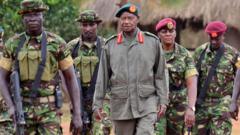What Is Uganda's Shadow Army Doing to Maintain the President's Power?

Published: 2025-10-17 01:01:00 | Category: technology
In Uganda, the Special Forces Command (SFC) is increasingly viewed as a private army aimed at bolstering the regime of President Yoweri Museveni and his family dynasty. Established shortly after Museveni took power in 1986, the SFC has become notorious for its alleged involvement in violence against opposition figures, raising concerns over the future of democracy in the nation.
Last updated: 27 October 2023 (BST)
Key Takeaways
- The SFC operates with significant autonomy and is seen as a "shadow army" loyal to Museveni.
- Gen Muhoozi Kainerugaba, Museveni's son, has led the SFC, solidifying family control over the military.
- Allegations of human rights abuses and violence against opposition figures have been prevalent.
- Recent legislative amendments have granted the SFC official military status, raising concerns over its legitimacy.
- The growing power of the SFC has created tensions within the Ugandan military, potentially leading to future conflicts.
Historical Context of Power in Uganda
Since gaining independence in 1962, Uganda has experienced a tumultuous political landscape characterised by military coups and rebellions. President Yoweri Museveni rose to prominence after leading a successful rebellion against the existing government in 1986. Over the years, his regime has faced numerous allegations of election rigging and violence against opposition parties, particularly during electoral periods. The SFC, initially conceived as an elite military unit to protect the regime, has increasingly been viewed as an instrument of oppression.
The Role of the Special Forces Command
The SFC was originally established to bolster Museveni's power and ensure the loyalty of the armed forces. It has evolved into one of the most powerful military units in Uganda, composed of highly trained personnel equipped with advanced weaponry. Dr Gerald Bareebe, a Uganda-born academic, emphasises that the SFC's primary function is to safeguard the regime by suppressing dissent and eliminating threats, whether from opposition groups or within the military itself.
Allegations of Human Rights Violations
Critics argue that the SFC's operations are often marred by human rights abuses, including abductions, torture, and extrajudicial killings of opposition activists. Notably, a recent case involved the court-martial of an SFC soldier for the murder of three individuals, highlighting the potential for violence within the ranks. Furthermore, Gen Kainerugaba's public statements and social media antics have raised concerns about the operational culture within the SFC, leading many to label it as a "torture squad."
Political Implications of the SFC's Power
The SFC's rise has implications beyond immediate military power; it threatens the very fabric of Uganda's democracy. As Museveni prepares for re-election, the SFC could play a pivotal role in stifling opposition campaigns, reminiscent of its actions during the 2021 elections. This has led to increasing fears among opposition leaders, who view the SFC as a tool of political repression.
The Influence of Gen Muhoozi Kainerugaba
Gen Kainerugaba's ascent to army chief has further cemented his family's grip on power. As the son of President Museveni, he has leveraged his position to expand the SFC significantly, with membership reportedly exceeding 10,000 personnel. His controversial remarks about fellow generals and neighbouring countries have created tensions within the military and raised questions about his leadership style.
Ethnic Dynamics Within the SFC
Concerns have also been raised regarding the ethnic composition of the SFC, which is perceived to favour members of Museveni's Banyankore ethnic group. This preferential recruitment has led to accusations of ethnic bias within the military, raising the possibility of future divisions and conflict, particularly in a post-Museveni political landscape.
Recent Legislative Developments
In a move that has drawn criticism from opposition MPs, the Ugandan Parliament recently passed legislation recognising the SFC as one of the official military services. This legal endorsement has been interpreted as a means of legitimising an entity that critics argue has operated outside the bounds of the law. The implications of this legislation could further entrench the SFC's power and influence within the Ugandan military structure.
Potential for Future Conflict
The growing power of the SFC raises concerns about potential conflicts within the military, especially as Museveni ages. Analysts warn that a lack of a clear succession plan could lead to a power struggle between factions loyal to the SFC and the regular army. Such internal discord could destabilise Uganda and lead to violence, echoing the civil conflicts that have plagued other nations in the region.
Opposition Response and Future Outlook
Opposition leaders, including Bobi Wine, have called for the disbandment of the SFC, arguing that its existence undermines democratic processes. As the political climate in Uganda becomes increasingly fraught, the role of the SFC will be crucial in determining the future trajectory of the nation. The upcoming elections in 2026 will be a critical test for both the regime and the opposition, as the SFC's actions will likely influence the outcome.
The SFC's actions and the regime's response to dissent are closely watched indicators of Uganda's political health. The interplay between military power and political legitimacy will be pivotal in shaping the future of governance in Uganda, as the nation grapples with the legacy of a long-standing autocratic rule. What remains to be seen is whether the SFC can maintain its current trajectory without igniting a broader conflict within the military or the society at large.
FAQs
What is the Special Forces Command (SFC) in Uganda?
The SFC is an elite military unit in Uganda established to protect the regime of President Yoweri Museveni. It is known for its specialised training and equipment, and has been implicated in human rights abuses against opposition activists.
Who leads the Special Forces Command?
Gen Muhoozi Kainerugaba, the son of President Museveni, leads the SFC. He has maintained significant influence over the unit and has been involved in controversial actions and statements that raise concerns about military conduct.
What allegations have been made against the SFC?
The SFC has faced numerous allegations of human rights violations, including abductions, torture, and extrajudicial killings of opposition members. Critics claim it operates with impunity under the protection of the Museveni regime.
How has the Ugandan government legitimised the SFC?
In June 2023, the Ugandan Parliament passed legislation recognising the SFC as one of the official military services. This move has drawn criticism from opposition parties, who argue it legitimises an entity that has operated outside the law.
What are the potential consequences of the SFC's power in Uganda?
The increasing influence of the SFC may lead to internal conflicts within the military, particularly if there is no clear succession plan following President Museveni's eventual departure from power. This could destabilise Uganda's political landscape.



